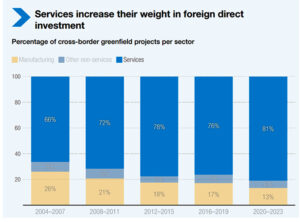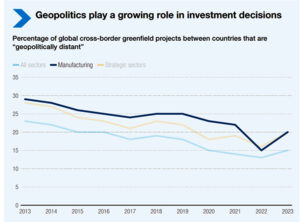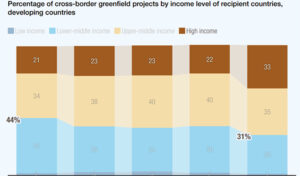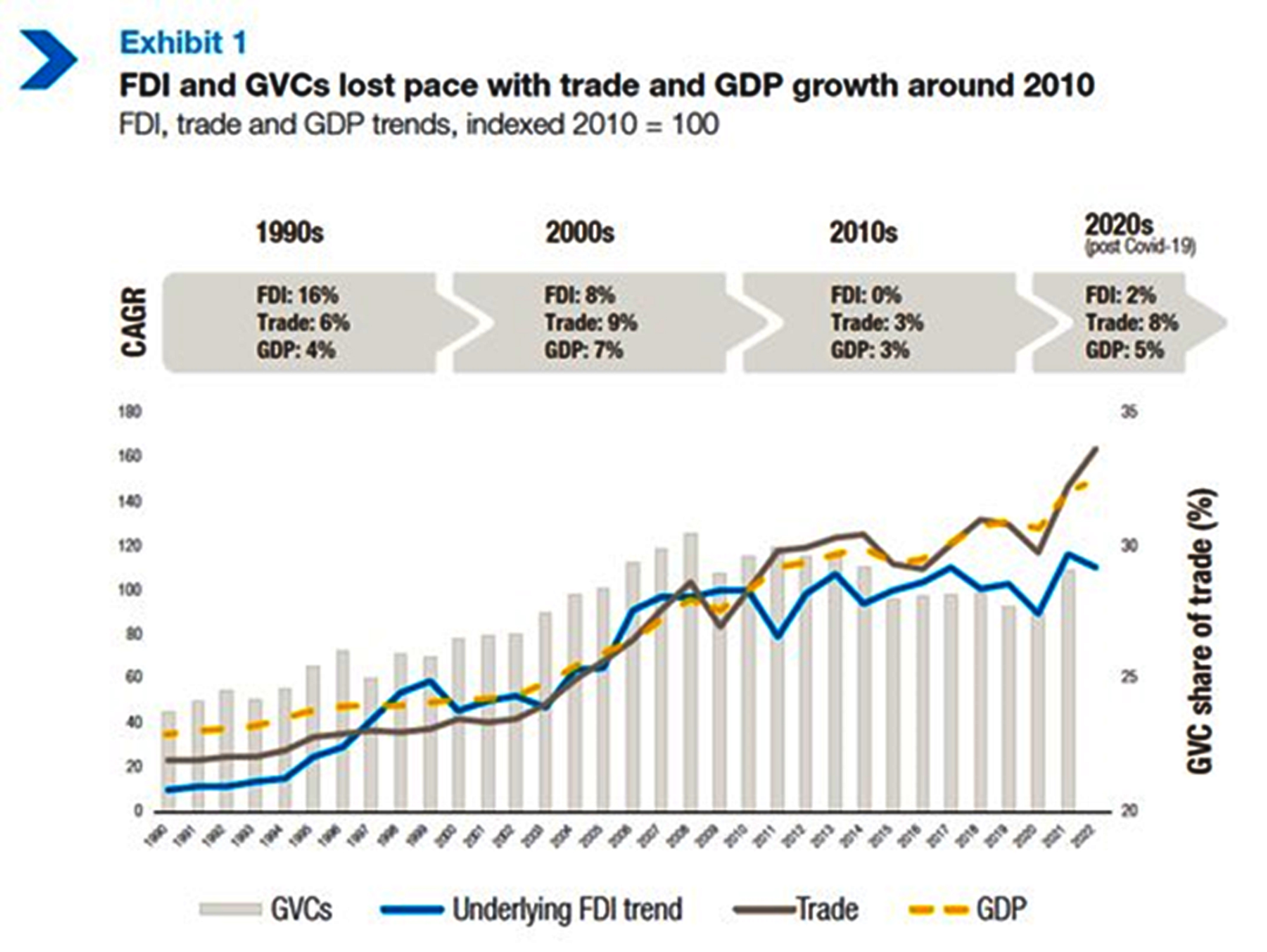A significant shift has taken place in the global economy with the growth of foreign direct investment (FDI) and global value chains (GVCs) no longer aligned with GDP and trade growth and even amidst rising trade tensions, global GDP and trade, since 2010, have continued to expand at an annual average of 3.4 per cent and 4.2 per cent respectively. In stark contrast, FDI growth has stagnated near zero per cent in the midst of rising protectionism, growing geopolitical tensions and increased investor caution, says the latest UN Trade and Development (UNCTAD) report “Global economic fracturing and shifting investment patterns” launched on 23rd April.
The report examines the complex landscape of global FDI and sheds light on how over the past two decades, transformative shifts driven by technological advances, policy developments and sustainability demands have reshaped globalisation, compelling FDI patterns to adapt in three key aspects. It emphasises the necessity of integrating sustainability and development into investment strategies and calls for innovative investment strategies to foster inclusive and sustainable economic growth. Here are some key findings.

Second, notes UNTAD, there is a widening gap in investment trends between manufacturing and services sectors with investments increasingly leaning towards services.
From 2004 to 2023, the share of cross-border greenfield projects in the services sector grew from 66 per cent to 81 per cent and services-related investment within manufacturing industries nearly doubled to about 70 per cent, driven by technological advances.
Simultaneously, FDI in manufacturing was stagnating for two decades before going down significantly, with a negative compound annual growth rate of -12 per cent in the three years after the outbreak of the Covid-19 pandemic.
The decline in manufacturing has severely impacted smaller economies, hindering their ability to participate in global production, upgrade production methods and adopt new technologies. On the other hand, expansion of the services sector mainly benefits larger developing economies that can effectively compete, creating an imbalance that leaves smaller ones at a disadvantage, accentuating disparities and underscoring the need for policies that provide all developing countries equal opportunities. The decline severely hinders developing economies’ efforts to leverage participation in GVCs for economic development and industrial transformation.
The share of cross-border greenfield projects in the services sector rose from about 65% two decades ago to over 80%. And services-related investment within manufacturing industries nearly doubled to about 70%, driven by technological advances.
Meanwhile, FDI in manufacturing has seen a significant downturn, with a compound annual growth rate of -12% in the three years following the outbreak of the pandemic. The decline severely hinders developing economies’ efforts to leverage participation in GVCs for economic development and industrial transformation.

A key finding of the report is that investment patterns in China have delinked from the rest of the world with the geography of global FDI being significantly re-shaped by China’s reduced role as a recipient country, a process that accelerated after the outbreak of the COVID-19 pandemic. Over the past three years, the number of greenfield projects to China has hovered at a level around one third the same figure a decade ago. Multinational corporations have shown diminishing enthusiasm for launching new investments in China.
However, China continues to play a dominant role in global manufacturing and trade, suggesting that its “global factory” mode has not downsized but instead transitioned from globally integrated production networks to more domestically focused ones.
The UNCTAD report flags concern over the transition from divergence to fracturing in global investment patterns amidst recent global conflicts and crises which have disrupted usual investment patterns, leading to unstable investment relationships and limited chances to benefit from strategic diversification. The report cautions that FDI decisions are now more frequently influenced by geopolitical factors, at times overriding economic determinants, complicating standard approaches to investment promotion and hindering FDI-based development. Investments between geopolitically distant countries – those with divergent political interests or foreign policies – decreased from 23 pr cent in 2013 to 13 pr cent in 2022. This trend particularly affected the manufacturing sector as trade tensions began to escalate in 2019.
The transition from divergence to fracturing and sectoral shifts and geographic rebalancing of FDI offer potential benefits but these are likely to be available only to a small group of developing economies. Most others face declining manufacturing investment and a shrinking pool of efficiency-seeking, lower value-added projects to leverage for GVC participation. Heightened uncertainty and fracturing are eroding the predictable and open global investment environment upon which they rely to support their development objectives.
The other cause for worry, says UNCTAD is that despite progress toward sustainability and the sustainable development goals (SDGs), impact on developing nations are mixed. The sustainability imperative and the drive to stimulate investment in the SDGs have opened new opportunities for investment-driven industrial development, particularly in environmental technologies. However, these new opportunities can only compensate in part for the lack of FDI growth in other industrial sectors.
The growing trend of FDI to environmental technologies offers new opportunities but fails to fully address the slowdown in other industries, specially affecting developing and least developed countries increasing the vulnerability of their economies. Investments in environmental technologies like wind and solar energy have surged. Their share of total greenfield projects in non-services sectors jumped from 1 per cent in the early 2000s to 20 per cent by 2023. Likewise, FDI in the manufacturing of electric vehicles and batteries has seen 27% annual growth over the past decade.

However, this growth only partially offsets the decline in other manufacturing sectors. It also primarily benefits developed countries, while least developed countries (LDCs) continue to struggle with reduced FDI in traditional sectors.
Given the imperitive to bridge investment disparities across sectors and regions, UNCTAD has called for immediate action to ensure that the benefits of investment are distributed more equitably and aligned with overarching developmental objectives. The key policy recommendations from UN Trade and Development underline the need for developing countries to revise their economic development strategies and calls on global policymakers, business leaders, and development agencies to enhance collaboration at global and regional level and work towards a more open and fairer global investment environment.























